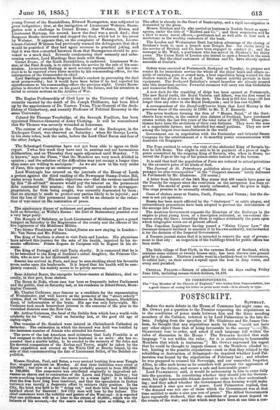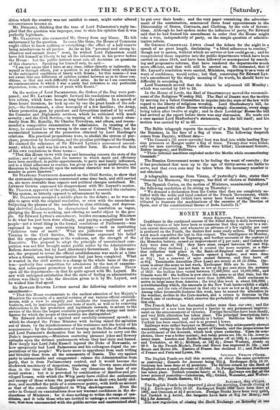POSTSCRIPT.
SATITRDAT.
' • Lord PALMERSTON said, it would be unbecoming in him to enter fully into the question. In considering whether they should join his Govern- ment, his right honourable friends desired to come to a clear understand- ing ; and they asked whether the Government then forming would make one demand a sine qua non of peace. Lord Palmerston replied, that " the demand was not one of those which the Government was at that time entitled to make a sine qua non of peace." The Allied Governments have repeatedly declared, that the conditions of peace must depend on the events of the war ; and that which may have been at one time a con- dltion which the country was-not entitled to exact, might under altered circumstances become so.
Mr. Menem; thinking that the tone of Lord Palmerston's reply im- plied that the question was improper, rose to state his opinion that it was perfectly legitimate.
Mr. GLADSTONE also exonerated Mr. Otway from any blame. He felt embarrassed by the question. In cases like these, the House of Commons ought either to know nothing or everything—the effect of a half-reserve being mischievous to all parties. As far as his "personal and strong in- clination and earnest desire " went, he wished Lord Palmerston could have felt himself at liberty to lay all the information in his power before the House : but the public interest must rule all decisions on questions of this character. Speaking for himself only, he said—
"I am not aware that I have at any time, either directly or indirectly, by myself or through others, put a question to my noble friend with reference to the anticipated conditions of treaty with 'Russia ; for this reason—I was not aware that any difference of opinion existed between us as to those con- ditions, or that any such difficulty would arise. As far as I am concerned, no eommunioation to which I was a party had reference to any particular stipulation, term, or condition of peace with Russia."
On the motion of Lord PALMERSTON, the Orders of the Day were post- poned; and Mr. LAYARD brought forward his resolutions on administra- tive reform, which have been po long before.the public. In a speech of
three hours' duration, he took up one by one the great heads of the sub- ject,—the Government, a close monopoly of a few families,- the Army, where promotion goes by purchase and favouritism instead of by merit ; the Consular and Diplomatic services, which be criticized with much severity ; and the Civil Service,—in treating of which he quoted abun- dantly from Mr. Romilly, Sir Charles Trevelyan, and others, and recom- mended a competitive examination for admissions. In treating of the Army, he confessed he was wrong in the case of Colonel Wilson • but he
accumulated instances of the promotion obtained by Lord Hardinge's relations. His practical propositions were, to-abolish the system of pur- chase, promotion by favouritism, and the peculiar privileges of the Guards. He claimed the substance of Sir Edward Lytton's announced amend- ment; which he said was his own in another form. He moved the first of his own resolutions in these terms— "That this House views with deep and Increasing concern the state of the nation ; and is of opinion, that the manner in which merit and efficiency
have been sacrificed, in public appointments, to party and family influences, and to a blind adherence to routine, has given rise to great misfortunes, and threatens to bring discredit upon the national character and to involve the country in grave disasters."
Sir STAFFORD NORTHCOTE descanted on the Civil Service, to show that the systematic improvements commenoed some time back, and still carried on, are more desirable than organic and political changes undefined. Mr. Lamest GOVVER expressed his disagreement with 'Mr. Eayard's motion. Mr. PEACOCK approved of the principle, because it censured the exclusive- Whig system, so bitterly opposed to advancement by merit.
Mr. Grensroisz occupied a middle place in the debate ; as he was un- able to agree with the original resolution, or even with the amendment. Subjecting the phrases of the resolution to close criticism, and depreca- tiug rhetorical declarations, he characterized the resolution as vague, pledging the House to nothing, and offering no useful object to the peo- ple. Sir Edward Lytton's amendment, besides recommending Ministers to do what has just been done already, and paying a compliment tolhe
people—not a usual thing in the formal resolutions of Parliament—was expressed in vague and unmeaning language — such as instituting "judicious tests of merit." What are judicious tests of merit ? Turning to the Civil Service, Mr. Gladstone expressed his belief that the system of patronage is the weakness, not the strength of the Executive. The pro to adopt the principle of unrestrained com- petition was not first brought under public notice by the Administrative Reform Association, but by Lord Aberdeen's Government. In like man- I ner, the proposal to revise the official establishments was made at a time when a formal, searching investigation had just been completed. What is wanted in the civil service ie a change in the whole basis of the sys- tem—perfectly free competition for admissions by the test of examina- tion, and subsequent promotion by merit and efficiency alone. Throw ; open all the departments—in that he quite agreed with Mr. Layard. He saw with unfeigned satisfaction that the state of feeling on administrative• reform was likely to take the direction given to it by Mr. Layard, and he wished him God speed.
Sir .Enweun BoLwr.a Lrrrow moved the following resolution as an amendment-
" That this House recommends to the earliest attention of her Majesty's Ministers the necessity of a careful revision of our various official establish-
ments, with a view to simplify and facilitate the transaction of public business, and, by instituting Judicious tests of merit, as well as by removing obstructions to its fair promotion and legitimate rewards, to secure to the service of the State the largest available proportion of the energy and intel- ligence for which the people of this country are distinguished."
Sir Edward delivered a spirited and carefully-composed speech ; in which he charged the Prime Minister with having raised the agitation out of doors, by the injudiciousness of his resistance and the levity of his acquiescence ; by the inconsistency of turning out the Duke of Newcastle, and Lord Panmure's declaration that be only intended to carry out the Duke's improvements,—Ministers scattering pleasant jokes and flowery epitaphs upon the defunct predecessors whom they had slain and buried. How deeply had Lord John Russell injured the Duke of Newcastle, or how egregiously had Lord Palmerston and his colleagues duped the ex- pectations of the people ! We have more to apprehend from such trifling and frivolity than from all the armaments of Russia. The cry against party is unreasonable and exaggerated : release the Administration from party, that is from Parliamentary control, and it would become the clockwork machinery of despotism, rendering the Crown more absolute than in the time of the Tudors. The cry threatens the basis of our social system ; but it is provoked by combination of families and pri- vileged houses, with which the Whig party have chilled the enthusiasm and energy of those whom the people recognize as their own hardy chil- dren, and mortified the pride of a numerous gentry, with birth as ancient as that of the coterie disciplined in Whig drawmgrooms. Even the order in Council on examinations does not warrant confidence in the de- clarations of Ministers ; for it does nothing to widen the range of can- didates, and it tells those who are invited to undergo a severe examina- tion, that men unconnected with the public service and unexamined shall be put over their heads ; and the very paper containing the advertise- ment of the examination, announced three head appointments in the Directorship of Stores, Contracts, and Clothing, by the rule of favour- itism. Although he had spoken under the influence of party, Sir Edward said that he bad framed his amendment in order that the House might take a vote, independently of party, on the simple question of adminis- trative reform.
Sir GEORGE CORNEWALL LEWIS closed the debate for the night in a speech of no great length, disclaiming " a blind adherence to routine," though not to system, without which no service or law could go on ; and he recapitulated those inquiries into the public departments which have been carried on since 1848, and have been followed or accompanied by search- ing and progressive reforms, that have rendered the departments much more efficient, and that will still be carried on. He intimated, that if Mr. Layard'a resolution were earned, Ministers, regarding it wee vote of want of confidence, would retire; but that, construing Sir Edward Lyt- ton's amendment by the simple meaning of its words, he should have no difficulty in accepting it.
Lord GODEILICH moved that the debate be adjourned till Monday ; which was carried by 240 to 29.
In the House of Lords, the Earl of Snapreenuay moved the recommit- ment of the Religious Worship Bill The Earl of DERRY met the motion by moving for a Select Committee to inquire into the state of the law with regard to the liberty of religious worship. Lord Shaftesbury's bill, he said, had passed the other House without a single discussion, every stage being taken after twelve at night ; and in their Lordships' House the bill had arrived at the report before there was-any discussion. He made out a case against Lord Shaftesbury's statements, and the bill itself; and his motion was carried by 47 to 30.
The Baltic telegraph reports the murder of n British boat's-crew by the Russians, in the face of a flag of truce. The following despatch comes from Dantzic, without date- " The Cossack's (21 screw-corvette) boat was fired into while landing Rus- sian prisoners at Haegoe under a flag of truce. Twenty-four were killed, only one man surviving. Three officers were killed; Lieutenant Geneste, Easton (surgeon), and Sullivan. "Three infernal machines exploded under the Merlin while reommoitering- Cronstadt."
The Russian Government seems to be feeling the want of recruits ; for it has proclaimed that •men up to- the age of thirty-seven are liable-to serve, and that even sons may be taken -when the necessary number is not obtained.
A telegraphic message from Vienna, of yesterday's date, states that "General La Marmora, the younger, has died of cholera at Balaklava."
The Spanish Cortes, on the motion of Ministers, unanimously adopted the following resolution at its sitting on Thursday- " We demand a declaration from the Cortes that they are completely sa- tisfied with the noble and loyal conduct of the French Government, which by its vigilance and aid (which have never been found wanting) has con- tributed to frustrate the machinations of the enemies of the liberties of Spain, and of the constitutional throne of Doha Isabella Il."



























 Previous page
Previous page